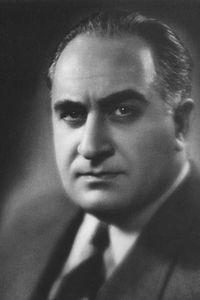Mikhail Konstantinovich Kalatozov, a filmmaker of extraordinary talent and distinction, was born Mikheil Kalatozishvili on December 28, 1903, in a world where the art of cinema was yet to be fully realized.
As a director of unimpeachable skill and artistry, Kalatozov's work would go on to leave an indelible mark on the cinematic landscape of both Georgia and Russia, his native countries, and the world at large.
Throughout his illustrious career, Kalatozov's films would showcase his mastery of the medium, as he skillfully wove together complex narratives, evocative atmospheres, and striking visuals, earning him widespread critical acclaim and a devoted following.
Born into a family of modest means, Kalatozov's early life was marked by hardship and struggle, yet he would eventually find solace in the world of cinema, where he would hone his craft and develop his unique vision.
Kalatozov's early work would be characterized by a strong sense of social responsibility, as he tackled topics such as poverty, inequality, and the human condition, imbuing his films with a deep sense of empathy and understanding.
As his career progressed, Kalatozov would continue to push the boundaries of cinematic storytelling, experimenting with innovative techniques, and collaborating with some of the most talented artists of his time.
Through his work, Kalatozov would leave an enduring legacy, inspiring generations of filmmakers to come, and cementing his place as one of the most important and influential directors of his era.
Mikhail Konstantinovich Kalatozov, a true master of his craft, would leave behind a body of work that would continue to captivate and inspire audiences for years to come, a testament to his unwavering dedication to his art and his unshakeable passion for the magic of cinema.
Kalatozov's cinematic masterpieces, most notably "The Cranes Are Flying" and "Soy Cuba", have transcended time and become an integral part of his enduring legacy, with his work continuing to captivate and inspire film enthusiasts globally. This remarkable filmmaker's remarkable body of work has earned him widespread acclaim and recognition, with the prestigious People's Artist of the USSR accolade, bestowed upon him in 1969, serving as a fitting tribute to his outstanding and invaluable contributions to the world of cinema.
Kalatozov's odyssey to achieving widespread recognition as a film director was characterized by a multitude of unpredictable events and pivotal changes of course. Before embarking on a career in the world of cinema, he initially pursued a degree in economics, which laid the foundation for a multifaceted and diverse range of professional experiences.
He subsequently went on to work in various capacities, honing his skills and broadening his horizons before finally transitioning to the world of cinema as an actor. This early foray into the performing arts allowed him to develop his creative muscles and gain invaluable experience in front of the camera.
As his passion for the craft of filmmaking continued to grow, Kalatozov's trajectory took another unexpected turn, as he began to work behind the scenes as a cinematographer. This role allowed him to utilize his artistic vision and technical expertise to shape the visual aesthetic of the films he worked on, ultimately paving the way for his future success as a renowned film director.
Kalatozov's impressive cinematic legacy is characterized by a diverse array of documentary films that have garnered widespread critical acclaim. Notably, his collaborative effort with Nutsa Gogoberidze, the pioneering Georgian female film director, resulted in the highly-regarded "Their Kingdom". Additionally, Kalatozov's 1930 masterpiece "Salt for Svanetia" stands out as a testament to his remarkable storytelling prowess and meticulous attention to detail.
Kalatozov embarked on an academic journey that led him to the esteemed Russian State Institute of Performing Arts, with his enrollment dating back to 1933. This marked the beginning of a significant chapter in his life, as he would later ascend to the helm of the Kartuli Pilmi film studio, exercising his leadership skills and expertise. Furthermore, his exceptional abilities and reputation caught the attention of the USSR State Committee for Cinematography, which subsequently extended an offer to him, providing a new platform to showcase his talents and contribute to the world of cinema.
Kalatozov embarked on a pivotal journey in 1939, relocating to the esteemed Lenfilm studio in Leningrad, where he would soon assume the esteemed role of film director. Amidst the tumultuous backdrop of World War II, Kalatozov demonstrated his versatility by directing a series of propaganda films that showcased his remarkable cinematic prowess. Furthermore, he was appointed as a cultural attaché at the Soviet embassy in the United States, leveraging his exceptional skills to spearhead a campaign that effectively promoted Soviet culture and ideals to a global audience, thereby fostering a deeper understanding and appreciation of the Soviet way of life.
Melville H. Nakamura
Kalatozov's unwavering passion for filmmaking was a defining characteristic throughout his life and professional journey, as he consistently demonstrated an unrelenting commitment to his craft, pouring his heart and soul into every project he undertook.
As a result, his body of work is marked by a distinctive and unmistakable style, one that has left an indelible mark on the world of cinema, and continues to inspire and influence generations of filmmakers who have followed in his footsteps.
Kalatozov's dedication to his craft was not limited to the films he made, but also extended to his approach to storytelling, which was characterized by a deep sense of empathy and a profound understanding of the human condition.
Through his work, Kalatozov was able to capture the complexities and nuances of the human experience, creating characters that were richly drawn and deeply relatable, and stories that were both poignant and powerful.
As a result, his films have become classics of world cinema, widely admired and studied by film enthusiasts and scholars alike, and continue to be celebrated for their technical innovation, emotional depth, and enduring relevance.
Kalatozov's legacy is a testament to the power of filmmaking to inspire, to educate, and to transform, and serves as a reminder of the impact that one person can have on the world through their work.
In short, Kalatozov's commitment to his craft has left a lasting legacy that will continue to be felt for generations to come.























